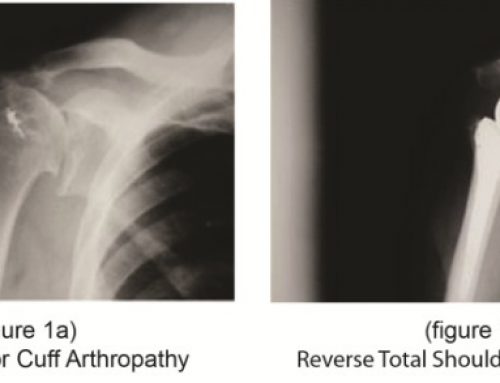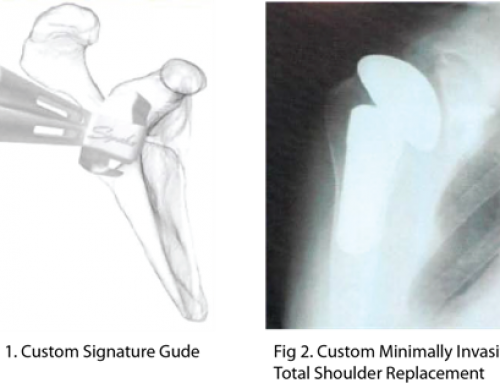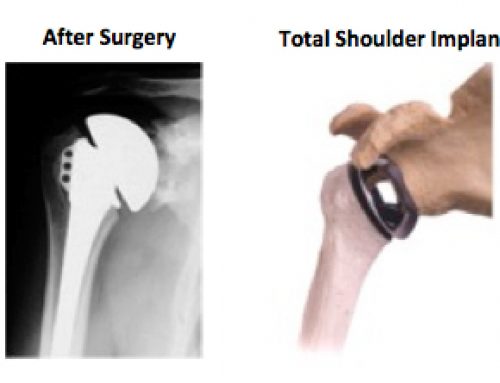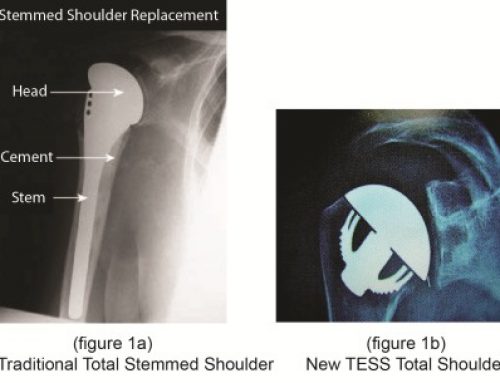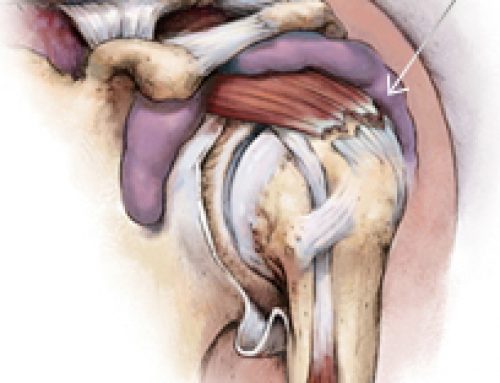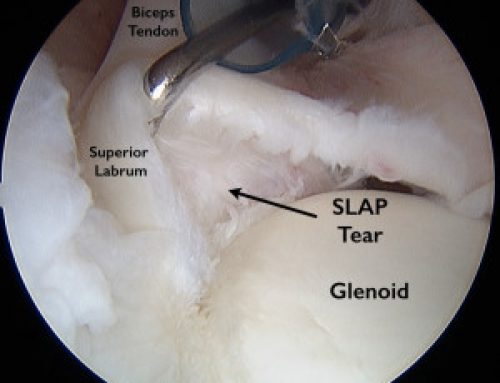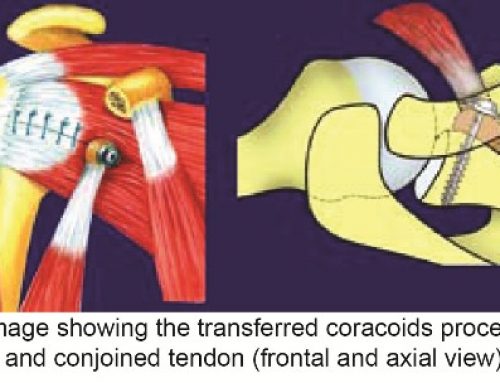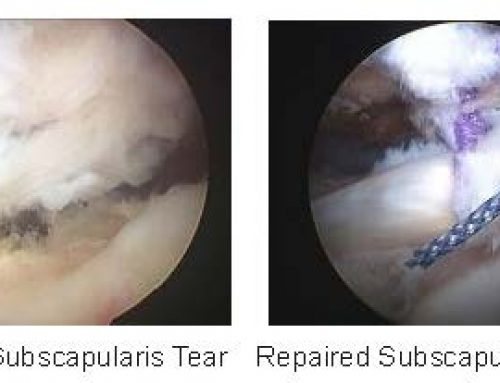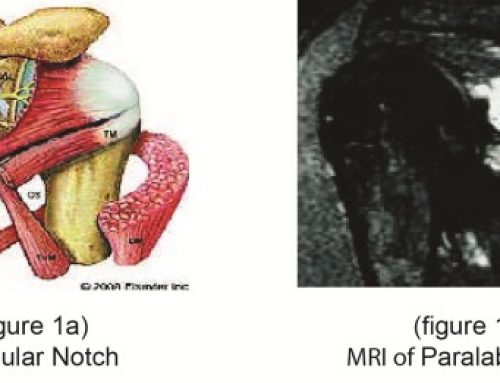Rotator Cuff Tear
by Dr. Richard Bartholomew
What is the rotator cuff?
There are four muscles inside of the shoulder that allow us to rotate our arm around. The tendons form a “cuff” around the humeral head, and that is how the name rotator cuff originated.
What is a rotator cuff tear?
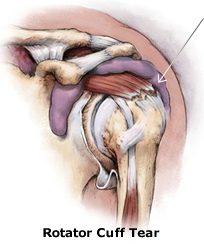 A rotator cuff tear is a tear in the shoulder in one of the rotator cuff tendons. Any of the four muscles can tear. The most common one to tear is the supraspinatus.
A rotator cuff tear is a tear in the shoulder in one of the rotator cuff tendons. Any of the four muscles can tear. The most common one to tear is the supraspinatus.
What are the symptoms of a torn rotator cuff?
When you get a torn rotator cuff, you have the same symptoms/pain as a patient with shoulder impingement syndrome. Symptoms usually include pain, weakness, and tenderness in the shoulder when reaching overhead, or behind the back, and when pulling and lifting items. The pain is usually felt over the lateral aspect of the shoulder. Neck and arm pain may be associated with this. Popping and/or snapping in the shoulder may be felt or heard. You will also experience weakness in the torn muscles. You will have more pain with overhead arm use.
Are there different kinds of rotator cuff tears?
Yes, you can have a partial or incomplete tear involving only a small part of the tendon. As the tear progresses and enlarges, it becomes a full thickness tear. You may also sustain tears of the different muscles. There are four rotator cuff muscles (See the shoulder anatomy section) which can tear. The most common ones to tear are the supraspinatus and the infraspinatus. Tears of different size do not discriminate. They all tend to hurt.
How do you diagnose a tear?
A complete history and physical in the office is mandatory to start. Most rotator cuff tears can be diagnosed this way. Radiological testing such as an MRI (magnetic resonance imaging) can be useful in defining the tear pattern, configuration and tendons involved. Ultrasound can be also be used in the office to diagnose rotator cuff tears.
OK, so my rotator cuff is torn.
There have been multiple studies to show that not everyone with a tear needs surgery. As with impingement syndrome, we will begin with physical therapy and oral anti-inflammatory medicine. Having a good physical therapist is a must. We work with the best shoulder physical therapists in Austin and the surrounding areas. If you have had therapy, have taken your anti-inflammatory medicines and you are not getting better you may be a candidate for surgery. Just the mention of surgery scares people, but this is a good thing. You see, some patients can be somewhat careless about therapy and their medicine, but if they know that the only other option is surgery, then they may be more religious with the prescribed treatments.
What is the natural progression of a torn tendon?
Physical therapy is designed to help the torn tissues/scar heal in a more normal fashion. If this happens in your shoulder, the tear could close up if it is a small partial tear. As this happens, the pain in your shoulder will get better and eventually go away. If you have a full-thickness tear, this is most often repaired arthroscopically.
I did my therapy, took my medicine, and I am still having pain. What is next?
If you do end up having to have a rotator cuff repair with surgery, relax. The rotator cuff tendon used to be repaired with a large incision in the front of the shoulder. This gave us access to the torn tendon for direct repair. New advances in arthroscopic rotator cuff repair enable us to use very small incisions through which small instruments are passed to suture the torn tendon. The small incisions give you less swelling, pain and tissue bleeding which translate to an easier rehabilitation for you and your shoulder.
Can all rotator cuff tears be fixed?
There are some tears that are so big and/or the tissue is so poor in quality that a rotator cuff repair will not be helpful. This is why it is important to get the proper treatment on your shoulder before it deteriorates. The status of the tear can be determined by your exam and by an MRI. These patients usually have a very poor range of motion in their shoulder and have a moderate amount of pain and discomfort. They will also have “wasting” and weakness of the rotator cuff muscles during the exam. Depending on your age, tear size, pain level and presence of other muscles around the shoulder, you may be a good candidate for a procedure which will eliminate your pain and improve your motion. If you think you may fit into this category, ask me if you are a candidate for a “reverse prosthesis” when you come and see me in our clinic.
Rotator Cuff Surgery Rehabilitation?
I have specific postoperative rehab protocols which we will use depending on the size of the repaired tear. I work with the best physical therapists in our Waterford, Michigan office. Having a good therapist is imperative for good post-operative success.
Dr. Bartholomew, orthopedic shoulder surgeon in Michigan, specializes in the treatment of rotator cuff tears. Call our office to schedule a consultation to diagnose your shoulder pain at (248) 673-0500.

